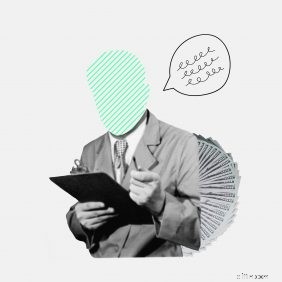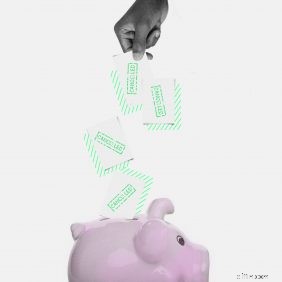50 maneras en que puede ahorrar dinero ahora mismo
Tienes que hacerlo tú mismo.
Si hay una lección que aprender de la devastación financiera provocada por el coronavirus en 2020, que sea esta:la ayuda está disponible, pero no solo llegará a usted.
Este año, puedes tomarlo literalmente. Como bien saben los estadounidenses que han pasado los últimos meses de distanciamiento social, al final del día estás solo. Y aunque hay una variedad de programas de ayuda disponibles para los millones de personas que han perdido el rumbo financiero, casi todos vienen con el mismo compromiso.
“Tienes que pedirlo, y pedirlo de la manera correcta”, como lo expresó recientemente Liz Weston de NerdWallet.
En virtud de la ley de estímulo del gobierno federal, por ejemplo, si se ha visto afectado por el COVID-19, tiene derecho a recibir una "adaptación" del emisor de su tarjeta de crédito, que puede incluir la exención de cargos por pagos atrasados, tasas de interés más bajas o incluso la capacidad de omitir pagos, sin afectar negativamente su informe de crédito. Pero para obtener ese alojamiento, debe hacer el trabajo preliminar llamando al emisor de su tarjeta de crédito y solicitándolo.
Del mismo modo, la misma ley le otorga el derecho de solicitar una indulgencia en una hipoteca respaldada por el gobierno federal durante al menos 180 días, lo que significa que puede saltarse los pagos sin acumular cargos por pagos atrasados o intereses adicionales. Esos pagos pueden vencerse en una suma global al final de los seis meses, o es posible que pueda agregarlos al final de su plazo, pero nuevamente, debe llamar a su prestamista y preguntar.
No son solo programas gubernamentales. En marzo, la división de financiación de automóviles de Ally Bank dijo que daría a los nuevos clientes un descanso en su primer pago durante 90 días. Bank of America dijo que aplazaría los pagos de los préstamos y los agregaría al final del plazo. TD Bank dijo que renunciaría a las tarifas por retirar cuentas de CD antes del vencimiento total. Pero en cada caso, lo adivinó, tenía que llamar y preguntar.
El gobierno agregará $ 600 adicionales a los beneficios semanales de desempleo hasta julio. Eso es automático... si logra obtener beneficios en primer lugar. Llegar a las oficinas estatales de desempleo se ha convertido en un esfuerzo hercúleo a medida que los sistemas arcaicos se inundan de repente. De hecho, relativamente pocos programas de ayuda fueron automáticos. Los cheques de estímulo eran, dentro de ciertos límites de ingresos, al igual que los programas de indulgencia para préstamos estudiantiles federales (pero no privados).
De lo contrario, depende de ti. Y en cierto modo, dicen los expertos en finanzas personales, siempre ha sido así. Nadie cuidará de sus finanzas como lo haría usted:ni un corredor, un CPA o un asesor financiero. Y ciertamente no el gobierno.
“Ese era mi objetivo cuando abrí Suze Orman Financial Group:hacer que las personas fueran lo más independientes posible de personas como yo”, dice la autora de finanzas personales y podcaster Suze Orman. “Cuando comencé mi firma, [mis clientes] tenían que ir a Charles Schwab y abrir su propia cuenta. Me pagarían una tarifa de asesoramiento. No administré dinero, porque quería que entendieran que podían administrar su propio dinero”.
“Si quieres encontrar al mejor asesor financiero del mundo, mírate en el espejo”, dice Orman. “Porque a nadie le importará más tu dinero que a ti”.
Orman dice que espera que aquellos que se han visto obligados a salir de un agujero financiero este año no olviden lo difícil que es y se esfuercen por ponerse en una posición en la que no tengan que depender de otras personas la próxima vez.
Si está listo para tomar el control de su dinero este año, aquí hay 50 lugares aprobados por expertos para comenzar.
Con información de Kara Cutruzzula. Ilustraciones de Elisa Faye.
Consulte los servicios de asesoramiento crediticio
 Ilustraciones de Elisa Faye
Ilustraciones de Elisa Faye No tienes que atravesar una situación financiera difícil por tu cuenta. Ya sea que tenga una gran cantidad de deuda con intereses altos o simplemente desee asesoramiento sobre presupuestos y ahorros, un asesor de crédito certificado puede brindarle asesoramiento personalizado gratuito o de bajo costo. La asesoría crediticia, comúnmente ofrecida a través de organizaciones sin fines de lucro, es una opción de bajo riesgo que lo ayuda a obtener una visión más clara de su situación financiera. Consolidated Credit lanzó Shutdown Hotline, un servicio telefónico gratuito que ofrece análisis de deuda y derivación a recursos específicos de COVID-19. Y la Fundación Nacional para el Asesoramiento Crediticio (NFCC) también ofrece servicios gratuitos de asesoramiento crediticio dedicados a ayudar a las personas a la luz de la pandemia.
Leer másAnalice su 'Número de supervivencia'
Muchas personas se están esforzando por ahorrar en este momento:¿qué tan bajo puedes llegar? Para determinar su "cifra de supervivencia", sume todos los costos mensuales de sus elementos esenciales mínimos:alquiler, comida, atención médica, etc. No necesariamente tiene que vivir con su presupuesto de supervivencia, y calcular uno no significa que Estás adoptando una mentalidad de escasez. De hecho, hay poder en saber cuán ingenioso puede ser, escribe Jully-Alma Taveras, colaboradora de NextAdvisor, creadora del canal de YouTube Investing Latina. El número de supervivencia de Jully-Alma es $581; usa su hoja de cálculo descargable para averiguar la tuya.
Leer másAbrir una Cuenta de Factura
Esto es ideal si a menudo se encuentra pagando tarde sus facturas o endeudándose. Sierra Howard de @IDontDoBudgets recomienda crear una cuenta de facturas dedicada calculando todos sus gastos fijos mensuales y agregando un colchón de $50 (para evitar cargos por sobregiro). Configure una cuenta de cheques separada, haga un depósito directo mensual en ella por el monto total y coloque sus facturas en pago automático desde esta misma cuenta. Considéralo prohibido y solo para facturas.
Corregir errores en su informe de crédito
Nuevo este año:las tres principales agencias de crédito (Equifax, Experian y TransUnion) le permiten verificar su informe de crédito de forma gratuita semanalmente hasta abril de 2021. Realice la solicitud en annualcreditreport.com, luego tome 15 minutos para completarla. su informe de crédito y asegúrese de que su información sea correcta. Aproximadamente uno de cada 5 consumidores tiene un error en su informe crediticio, según un informe de la Comisión Federal de Comercio de 2013, y algunos errores le costarán dinero adicional en préstamos o pólizas de seguro. Además, con las nuevas opciones de indulgencia de deuda que se extienden debido a las dificultades de COVID-19, hay aún más razones para hacer una verificación de precisión. Esas adaptaciones no deben reflejarse en su informe como despectivas. Si encuentra un error, use nuestra plantilla de correo electrónico para enviar una queja; las agencias de crédito tendrán la obligación legal de investigarlo.
Leer másConfigurar alertas bancarias
Si evita mirar los saldos de su cuenta porque lo estresa, está perdiendo la oportunidad de ser más intencional con sus gastos. A veces es mejor dejar que la información llegue a usted:vaya a su plataforma de banca en línea y configure una alerta por correo electrónico o móvil para cada cargo de tarjeta de crédito o deuda de cuenta. Es posible que detecte gastos que ni siquiera conocía, como suscripciones periódicas.
Pruebe una nueva estrategia presupuestaria
Lo más probable es que su presupuesto se fue por la ventana este año. Ya sea que haya tenido un impacto en los ingresos o haya cambiado sus hábitos de gasto durante el bloqueo, probablemente sea un buen momento para controlar sus finanzas. Una táctica que vale la pena probar:el presupuesto de base cero. Lo obliga a designar un propósito para cada dólar que gana, por lo que es una excelente manera de restablecer sus intenciones sobre el ahorro y la gestión de deudas. La autora de "Broke Millennial" (y colaboradora de NextAdvisor) Erin Lowry dice que es particularmente útil para las personas con ingresos irregulares.
Leer másPresione Pausa en su hipoteca
Es algo a considerar, con salvedades. La Ley CARES (Coronavirus Aid, Relief, and Economic Security) ha facilitado que la mayoría de los propietarios de viviendas ingresen a programas de indulgencia, esencialmente suspendiendo o reduciendo los pagos de la hipoteca por hasta un año, sin dañar sus puntajes de crédito ni incurrir en tarifas especiales. Aquellos con hipotecas respaldadas por el gobierno federal pueden seguir este camino llamando a sus prestamistas, pero primero debe conocer las compensaciones. Se seguirán acumulando intereses y deberá compensar los pagos atrasados en el futuro.
Leer másSolicite beneficios de desempleo ampliados
Los beneficios de desempleo son una red de seguridad crucial en tiempos de crisis. Por primera vez, muchos trabajadores independientes, contratistas independientes y trabajadores a tiempo parcial son elegibles para recibir beneficios, gracias a la disposición de la Ley CARES para la Asistencia de Desempleo por la Pandemia (PUA). El paquete de estímulo también agregó un beneficio semanal adicional de $ 600 a cualquier reclamo elegible, aunque eso expirará a fines de julio. Solicitar beneficios puede ser complicado y llevar mucho tiempo, especialmente porque los estados se están poniendo al día con la acumulación de solicitudes. Si cree que es elegible, le recomendamos presentar la solicitud en línea y estar preparado con la información necesaria.
Leer másQuit Smoking
Everyone knows it’s an expensive habit, and COVID-19 has given us a new incentive to keep our lungs healthy. In the U.S., the average price of a pack of cigarettes is $6.28. Use this calculator to determine how much money quitting will save you weekly, monthly, even after 20 years, based on how many cigarettes you smoke a day and the cost of a pack in your area.
Call Your Lenders
 Illustrations by Elisa Faye
Illustrations by Elisa Faye If you can’t afford to pay your bills right now, it pays to be proactive. Many credit card issuers and lenders are working out deals with people who have lost income due to the pandemic, and experts say it’s in your best interest to be transparent about your situation before you fall behind. Call your lenders, explain your circumstances, and ask about any hardship programs they have in place. They might lower your interest rates, allow you to skip or defer payments, or pay later with additional interest, all of which are better options than skipping payments altogether. Liz Weston offers useful talking points here. And as Ron Lieber at the New York Times recommends, document your conversations to make sure your lenders follow through on what they say.
Get Help with Home Buying
Believe it or not, the housing market is still churning, and many Americans are moving forward with their dreams of becoming first-time homeowners. If that’s the case for you, consider whether there are any special loans, grants, or assistance programs you can take advantage of. We talked to Olivia Bernard, a 23-year-old who bought her first home in Georgia in part thanks to multiple assistance programs. Check out this list of resources, which has links to first-time home buyer services in every single state.
Read moreGet a Balance Transfer Credit Card
If you’re having trouble paying down your credit card debt because the interest portion is high and you have good credit, you might be a candidate for a balance transfer. Many of these cards offer an introductory 0% APR, meaning you can give yourself time to pay off the debt without interest. Due to the impact of COVID-19 on the economy, credit card issuers are a bit nervous about extending credit, making access and incentives less available than before the pandemic. But if you’ve got a high credit score (around 670 or higher), it’s a financial tool worth considering. Be aware this move often comes with fees:It can cost between 3% and 5% of your balance to transfer your debt to the new card.
Read moreRedirect Your Savings
How different are your spending habits today compared to six months ago? With many recreational activities ruled out because of the lockdown, one smart tactic is to take all the money you were spending on a gym membership, eating out, travel, and social activities, and funnel it into a high-yield savings account or paying down debt. Not only will you get a better sense of where you want to spend your money again when you’re able), but you’ll feel like you accomplished something when your favorite activities do return.
Build Your Emergency Fund
This one’s important. Building a savings cushion is a fundamental step toward financial wellness — one that can protect you in tough times and help you grab opportunities in good times. This year’s sudden unemployment crisis shows us not only how useful an emergency fund is, but how hard it is to achieve. Don’t be overwhelmed, though. Start small with a goal that feels reasonable to you. Putting even a few dollars away every month for the future can become a lifeline during extreme circumstances. Check out our emergency fund guide for more inspiration.
Read moreRefinance Your Mortgage
Homeowners:If you have job security and expect to be in your home for more than a few years, now could be the time to take advantage of low mortgage rates. The government has lowered both short- and long-term interest rates to encourage investments and keep the market stable. These rates give homeowners the opportunity to lower their monthly mortgage payments, adjust their loan term, or get a fixed-rate mortgage instead of a variable-rate mortgage. Don’t be afraid to shop around and compare rates from various lenders to make sure you’re getting a good deal. And don’t rush it — low interest rates are here to stay for a while, experts say.
Read moreGet a Spotify Discount
How’s this for easy listening:You can save about $12 a month by switching to a Spotify family account and splitting the cost with up to five people.
Follow the Experts
Make your screen time a bit more productive by adding a dose of money inspiration to your feed. Danetha Doe has one mission:to elevate the self-worth and net worth of women. NextAdvisor contributing editor Farnoosh Torabi answers questions and interviews notable guests three times a week on her podcast “So Money.” And Tiffany “The Budgetnista” Aliche says she has helped more than 800,000 women save more and pay off debt.
Return One Item
Look around your house or apartment. Is there anything you recently purchased that you haven’t opened or used because it wasn’t quite what you imagined or needed? Don’t let it sit there. Fill out the return form to get your money back, then arrange to have it picked up or drop it off at the post office if possible. There’s no point in eating the cost of something you’re not going to use.
Borrow From Your 401(k) — But Only If You Have To
This is usually a big no-no, but tough times require tough moves. Taking money out of your 401(k) or other retirement account can pull you off track from your long-term goals and lock in market losses, but personal finance experts say it can be a better move than taking on unmanageable debt right now. That’s partly because the calculus has changed in 2020, with federal stimulus legislation waiving the usual steep penalties that come from tapping your 401(k) early. Read up on the new rules and see if this is the right move for you.
Read moreCheck Your Subscriptions
 Illustrations by Elisa Faye
Illustrations by Elisa Faye Maybe you signed up for a cable channel for one sporting event, or subscribed to an online program when you needed to learn a certain skill. But are they still relevant to your life now? A quick scan through a credit card bill can help you discover any recurring subscriptions and monthly payments that you no longer need. Take a few minutes to cancel them and consider all the money you’re saving.
Stay Away From Credit Repair Companies
Building good credit is essential to your financial health, and poor credit will cost you. So it might seem tempting to hire a credit repair company that promises to do the work of repairing your credit score for you. Many such companies have stepped up their advertising outreach during the pandemic. But beware:These companies aren’t worth the cost, and you can do everything they promise to do by yourself — for free.
Read moreChoose a ‘No-Spend Day’
This is easier than you think, especially if you’re spending a lot of time in your home. Pick one day of the week where you commit to spending zero dollars — no ordering takeout or buying anything online. If all goes well, repeat the following week.
Upcycle Something in Your House
If you want to cut back on shopping, you can still get creative. The Instagram account @upcyclethat features tutorials to transform everyday or discarded objects into something new.
Get Credit for Your Work
Your credit report follows you for life, and it tracks your financial history in obsessive detail. Then, banks use the information on your report to calculate your credit score, a three-digit number that determines what kind of terms you’ll get on financial products like mortgages or insurance policies. Before the stakes are too high, like when you’re applying for a car loan, get familiar with how your credit score is calculated. The formula’s not a secret, and with enough time and patience you can manipulate it. Plus, the same behaviors that will boost your credit score are also likely to get you in better financial shape.
Read moreJoin an Online Community
Sometimes it’s helpful to know that other people are going through a similar situation. The free online network Ladies Get Paid has thousands of members offering help on finding a job or looking for a mentor, and NPR’s Facebook community Your Money or Your Life features advice from members on saving and investing.
Funnel Your Transportation Cash
Subway ridership in New York is down 92%, which means thousands of people are saving money usually spent on their daily commute — as much as $127 per month, if you typically buy a 30-day MetroCard. The same goes for car-friendly cities, too. Rather than spend that savings elsewhere, take the money usually spent on gas or public transportation and earmark it for a future use.
Choose the Right Bank Account
Saving money is hard. Don’t make it harder by using the wrong type of bank account. Your four main options are a savings account; a checking account; a certificate of deposit, or CD; and a money market account, or MMA. Check out our guide to choosing the right one, which is all about finding the optimal balance of interest rate, liquidity, and fees. And remember you can use a mix of accounts that suit your goals, such as CDs for a future down payment and a high-yield savings for an emergency fund.
Read moreGet Obsessed With Online Books
Your bookstore or local library might be closed, but their digital resources aren’t. Many library systems are connected to apps like OverDrive and Libby, which allow you to check out digital books from home — for free. Plus, signing up for a library card has never been easier and can usually be done from home.
Spend Your Credit Card Points
If you have a rewards credit card that racks up points with every dollar spent, now may be the time to cash them in. Maybe you were saving those points to redeem on a big trip — but if that no longer looks likely, you can instead use them to shop on your Amazon account, spend them at other stores on necessities you would have bought anyway, or even get cash back.
Use the 5-Second Rule
 Illustrations by Elisa Faye
Illustrations by Elisa Faye One trick to move forward on your money matters is to use the “5 Second Rule” created by author and talk show host Mel Robbins. It’s simple:When you have an instinct to act on one of your financial goals, Robbins says you have to do it immediately — or else your brain will find a way to shut it down. So if you want to be proactive, count backwards:5-4-3-2-1. When you reach “1,” take action. Check your accounts, look at your taxes, resist the impulse purchase. Counting down and giving yourself that window of time can distract you from worries and excuses.
Finish That Course You Already Bought
Maybe you wanted to learn a new skill or finally committed to buying the Malcolm Gladwell MasterClass six months ago, but then never actually started it. Now’s the time, according to Tonya Rapley of @MyFabFinance. You can calculate what you already spent on the course, and tell yourself you’re getting that money back — plus new knowledge — when you complete the course.
Check Out High-Yield Savings Accounts
The current national average savings rate is a measly 0.07% — but you can earn 10 times that by choosing a high-yield savings account with an online bank. If you’re fortunate to have some savings, or you’re working on building them up, consider moving that cash to a high-yield online savings account such as the ones offered by Ally and Marcus by Goldman Sachs. Your money will still be relatively accessible, but it’ll earn much more interest than it would in a traditional bank account. Compare your options, taking care to find the highest interest rate without any monthly maintenance fees or minimum balances.
Read moreConsider a New Student Loan Schedule
If you have a federal student loan, your payments have been suspended from March 13 to September 20, 2020 due to the COVID-19 crisis. This temporary relief can be extremely helpful if your income has gone down. Keep in mind that in most cases, interest will keep accruing even while you sit out payments. If your income hasn’t been affected in recent months, and you can afford it, continue making payments. And if you need your payments to be more manageable in the long term, you can talk to your loan servicer about an income-driven repayment plan, in which your monthly payment is based on your income — and in some cases can be driven down to $0.
Become a Contact Tracer
Increased testing and tracing are two strategies for preventing the further spread of COVID-19 — and contact tracing is one of the fastest-growing jobs right now. It involves calling people who came into contact with confirmed positive patients, checking symptoms, and referring them to nearby resources. Qualifications vary by state and can range from having a high school diploma to a college degree, but tracing is usually fully remote and ranges from $17 to $22 an hour. Take this free course offered by Johns Hopkins University and look up the job requirements in your state.
Work on Your Estate Plan
Nobody likes to talk about death, but you’ll do yourself and your family a huge favor if you get your affairs in order while you’re healthy. If you don’t have a will or other estate documents, consider doing it now. Working with an attorney to draw up basic documents can cost between $500 to $1,000, advises CBS News business analyst and NextAdvisor contributor Jill Schlesinger — or there are online services like Quicken WillMaker &Trust, which costs around $90. Think of it as the smartest money move you can make for the future.
Read moreNegotiate Your Cell Phone Plan
How much data do you use per month? How many texts do you send? The cell phone plan you signed up for two years ago might not be as relevant to your life today. Log in to your account, check your usage, and call — yes, call — your cell phone company to negotiate your bill or adjust your plan. Knocking even $10 off a month will add up.
Talk to Your Landlord
Typically, this isn’t the most enticing idea, but when rent takes up an average of 35% of your income, it’s a good place to look for savings. If you’re renting and plan to stay through your lease, or possibly extend, and you’ve been a model tenant so far, try asking the owner to knock some dollars off your rent. With many people plotting to move elsewhere or outside bigger cities, they might rather keep a good tenant than risk searching for a new one. You’ll gain even more leverage if you team up with your neighbors and negotiate as a group.
Make Your Contributions Count
If you’re donating to a nonprofit or social justice organization like the NAACP Legal Defense Fund, try to make your money go even further. Many employers have a charitable match program — if they do, your money could go twice as far. Ask your HR department if you can’t find any details. Plus, keep an eye out on social media, because some generous individuals are offering to personally match donations if you share a screenshot of yours.
Avoid These Home-Buying Mistakes
If you’re thinking about buying a home in the near future, get educated on the money traps you might face. Putting down a small down payment, buying a house you can’t afford, failing to get a preapproval, getting the wrong kind of mortgage … there’s a lot to look out for. That’s why we asked Chris Hogan, author and personal finance expert, to walk us through the eight most common mistakes that first-time home buyers make.
Read moreBuy a Bike
With public transportation seeing record low ridership during lockdown, many are turning to alternate forms of getting around. Consider investing in a bicycle — not only can it save you money when it comes to subway fare or putting gas in the car, but it’s a cheaper form of exercise than a gym membership. Fair warning:Other people have had the same idea, and many bicycle companies are reportedly backlogged.
Find a New Go-To Cheap Meal
 Illustrations by Elisa Faye
Illustrations by Elisa Faye Sick of canned beans? Follow @budgetbytes on Instagram for delicious recipes that are also budget-friendly, like this“pizza” pasta salad, blackened shrimp tacos, or mushroom broccoli stir fry.
Trade In Your Electronics
If you’re in the market for a new phone, don’t forget about the one you already have. Apple has a trade-in program that offers up to $500 credit for certain devices, which can be used on a new purchase or as future store credit. You can also trade in an old computer for credit via the Apple website or, starting mid-June, in Apple’s retail stores. The trade-in program extends to tablets and watches, too. For other phones, Verizon offers a trade-in program, as does T-Mobile.
Automate, Automate, Automate
If you have a pang of fear every month and ask yourself, “When’s the credit card due? Is my electric bill paid? How much should I put into savings every month?” do yourself a favor and automate most – if not all — of your online bills and investments. Setting up automatic payments once will save you time, energy, and — yes — money every month (those late fees add up). Just make sure you’re adding enough cushion to your checking account to avoid any overdraft fees.
Sell Your Old Stuff
If lockdown encouraged you to go through your closet, you can list and sell some of your old clothes on a site like ThredUp, which calls itself the world’s largest online secondhand shopping destination — and recently partnered with Walmart to expand its e-commerce resale options. If you have more than just clothes, LetGo is another marketplace where you can connect with buyers.
Check in on Your Retirement Plan
“With so many other pressing financial demands — combined with living through a global pandemic and likely recession — it’s completely understandable why you may scoff at the notion of retirement,” writes Erin Lowry. But ignoring this situation now will only make things harder in the future. Assuming you’re able to meet your essential needs right now, Lowry breaks down a few smart tactics for keeping your retirement planning on track.
Read moreCharge More
No, not on your credit card. If you’re self-employed, a small business owner, or a freelancer, take a hard look at the rates for your services. When’s the last time you increased them or gave yourself a raise? Not all industries are down this year—if you have clients who are weathering the recession, consider starting the conversation. This applies to full-time workers too. Budgeting and saving hacks will get you far, but earning more will truly power up your finances.
Do Your Taxes
This year, Tax Day was postponed until July 15, giving people a little extra time to pull together their documents and file. But if you’re still putting it off, don’t wait:Since a majority of people get refunds every year, think of it as money waiting to be received.
Nail Down Your Emergency Fund Target
Every single expert says you should have an emergency fund. But once you dig into the details, there’s a lot less agreement. Should you sock away $1,000? Three months of expenses? A year of expenses? The truth is that the answer depends on many individual factors, like your job security, your goals, and even your age. We polled 11 different personal finance experts for their recommendations — and got 11 different answers. See which emergency fund target is right for you, and let that number be your guide as your work toward your savings goals.
Read moreStop Betting on the Lottery
The average American spends nearly $70 a month on lottery tickets and betting pools, according to research released by the Bureau of Labor Statistics last year. For older Americans, that figure is even higher:up to $132 per month. If you’re one of the people driving up those averages, compare the long odds of hitting the jackpot with the guaranteed interest rate you’d get on that money if you put it into a high-yield savings account.
Get a Deal on a Car
It’s not wise to rush into any big purchase, especially a car. But the recent bankruptcy of rental-car company Hertz has flooded the market with relatively cheap used cars, and experts say you may be able to get a steal of a deal. If you need to finance the purchase, make sure you can manage the debt. Author Suze Orman says a good rule of thumb is that you shouldn’t finance a car unless you can afford to pay it off completely within 3 years.
Ahorros
- 10 formas diferentes de ahorrar agua dulce
- ¿Puede una casa pequeña ahorrarle mucho dinero?
- ¿Puede ahorrar dinero plantar un jardín?
- Las 4 formas principales en las que desperdicia su dinero
- Los sitios de devolución de efectivo pueden ahorrarle mucho dinero
- 5 formas de ahorrar para la universidad ahora
- 4 formas sencillas en las que su teléfono puede realmente ahorrarle dinero
- 101 formas de ahorrar dinero
- 5 maneras en que la organización puede ahorrarle mucho dinero
-
 5 maneras en que ser un trabajador remoto puede ahorrarle dinero
5 maneras en que ser un trabajador remoto puede ahorrarle dinero Es probable que gaste mucho menos dinero como trabajador remoto:estas son algunas de las formas en que puede ahorrar mucho. Ser un trabajador remoto viene con muchos beneficios. Puede ofrecer la ...
-
 4 formas en que un puntaje crediticio alto puede beneficiarlo
4 formas en que un puntaje crediticio alto puede beneficiarlo Un gran crédito realmente podría ser útil en más maneras que uno. Puntos clave Tener un buen crédito hace que sea más fácil obtener préstamos asequibles. Hay otras ventajas menos conocidas de tener...


